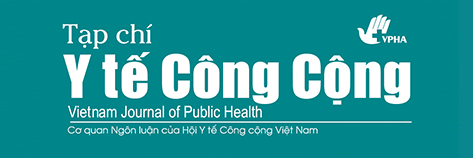Tình hình chơi GameOnline quá mức và các yếu tố liên quan ở học sinh THCS Hà Nội năm 2009 (GameOnline overuse and related factors among secondary students in Hanoi 2009)
Tóm tắt
GameOnline (GO) là một loại hình giải trí hiện đại và hữu ích nếu chơi với thời gian hợp lý và điều độ. Nếu chơi quá mức sẽ dẫn đến những hậu quả tiêu cực về mặt thể chất, tinh thần và xã hội. Nghiên cứu nhằm xác định tỉ lệ chơi GO quá mức và các yếu tố liên quan của học sinh (HS) 3 trường trung học cơ sở tại Hà Nội, sử dụng thiết kế cắt ngang phân tích với bộ câu hỏi tự điền. Chọn mẫu cụm với cỡ mẫu 980 HS được tính để ước lượng tỷ lệ với hệ số thiết kế 2,5. Trong 980 HS khối 7, 8 và 9 có 47,4% nam. HS được xác định chơi GO quá mức khi chơi trung bình >3 giờ/ngày liên tục trong một tháng. 799 (81,5%) HS đã từng chơi GO, trong đó 522 em duy trì hành vi chơi đến một tháng gần nhất tính từ thời điểm điểm điều tra trở về trước, trong đó, 23,1% chơi quá mức. Yếu tố liên quan với tình trạng chơi GO quá mức được xác định gồm (i) yếu tố cá nhân: giới tính, hiểu biết chung về ảnh hưởng của GO, học lực, thời điểm và địa điểm chơi, thời gian chơi (OR>2); (ii) yếu tố gia đình: mối quan hệ giữa bố mẹ, việc quản lý chơi GO, sự quan tâm chia sẻ giữa HS và phụ huynh (OR>1,7); (iii) yếu tố nhà trường: sự quan tâm của bạn bè, thầy cô (OR>2). Từ kết quả nghiên cứu cho thấy rằng cần phải có sự can thiệp và tham gia của các nhà quản lý giáo dục, nhà trường, phụ huynh và chính các em học sinh nhằm hạn chế tình trạng chơi GO quá mức và những tác động tiêu cực đối các em.
English abstract
GameOnline (GO) is a popular kind of entertainment for adolescents, but it is likely to lead physical, mental and social consequences as oversue. The cross-sectional study which used a self-administered questionnaire aimed to identify situation of GO overuse and related factors among 980 secondary students (47.3% males) aged 12-14 years in three schools in Hanoi. GO overuse was defined as playing GO more than 3 hours/day during a recent month. There were 23.1% of secondary students were GO overuse. Many factors related to overuse included (i) personal factors: gender, learning capacity, knowledge of GO, playing time, places, and length; (ii) family factors: situation of parental relationship, internet and GO management of parents, mutual care of family members; (iii) school-related factors: student-teacher relationship and friendship. The results recommended that the participation of educational managers, the school, parents and students themselves is necessary to prevent GO overuse and its nagative effect on the youth.
Từ khóa
Toàn văn:
PDF (English)##submission.citations##
Tài liệu tiếng Việt
Bộ bưu chính viễn thông-Trung tâm Internet Việt Nam (2010). Thông báo số liệu phát triển Internet Việt Nam [Internet]. [Trích dẫn ngày 26/05/2010]; Lấy từ: http://www.thongkeinternet.vn/jsp/trangchu/index.jsp.
Bộ Y tế, Tổng cục thống kê, Tổ chức Y tế thế giới, Quỹ nhi đồng Liên Hợp Quốc (2003). Điều tra Quốc gia về Vị thành niên và Thanh niên (SAVY) [Internet]. [Trích dẫn ngày 16/08/2009]; lấy từ: http://www.unicef.org/vietnam/vi/media_2390.html.
Sở giáo dục và đào tạo Hà Nội (2007). Công văn số 2696/UBND-KT về việc Quản lý, giáo dục học sinh về Internet, GameOnline trong trường học [Internet]. [trích dẫn ngày 14/07/2009]; lấy từ: http://www.hanoi.edu.vn/.
Nguyễn Thị Phương Thảo (2007). Tác động của GameOnline đối với việc học tập và nâng cao kiến thức của học sinh đô thị hiện nay (Nghiên cứu trường hợp tại Ninh Bình). Luận án thạc sỹ, Trường Đại học KHXH&NV.
Tài liệu tiếng Anh
Ahn D.H (2007), Korean policy on treatment and rehabilitation for adolescents’ Internet addiction, International Symposium on the Counseling and Treatment of Youth Internet Addiction, National Youth Commission, Seoul, Korea, p 49.
Artemis T, Elena C, et al (2008). Internet use and misuse: a multivariate regression analysis of the predictive factors of internet use among Greek adolescents. European Journal of Pediatrics [Cited 2009 Aug 20]; 168(6): 655-665. [1 screen]; Avaiable from: URL: http://www.ncbi.nlm.nih.gov/ pubmed/18762980
Chin-Sheng, W. & Chiou, W.B. (2006), Why Are Adolescents Addicted to Online Gaming? An Interview Study in Taiwan, Cyberpsychology & Behavior, [serial online] [Cited 2009 Sep 12]; 9 (6): 762-766. [5 pages]; Avaiable from: URL: http://www.liebertonline.com /doi/pdf /10.1089/cpb.2006.9.762
Choi Y.H. (2007), Advancement of IT and seriousness of youth Internet addiction, 2007 International Symposium on the Counseling and Treatment of Youth Internet Addiction, National Youth Commission 2007, Seoul, Korea, p 20.
Griffiths, M.D., Davies, M.N., Chappell D. (2003). Online computer gaming: a comparison of adolescent and adult gamers. Journal of Adolescent.; [serial online] [Cited 2009 Sep 12]; (27): 87-96. [9 pages]; Avaiable from: URL: http://www.lionlamb.org/research_articles/ study5.pdf
Michael, Xue Qiang (2008). Demographics, Motivations, Addictions and Usage Patterns among Chinese College Student MMORPG Players. Graduation Project for the Degree of Master of Science. School of Journalism and Communication-The Chinese University of Hong Kong
People’s Daily Online (2007). The more they play, the more they lose [Internet]. [Cited 2009 Api 21]; Available from: URL:http://www.chinadaily.com.cn/china/2007-04/10/content_846715.htm.
Young K. (2009), You are an obsessive online Gamer [Internet]. [Cited 2009 Aug 15]; Available from: URL:http://www.netaddiction.com/index.php?option=com_content &view= article&id=80%3Agamer&catid=42%3Arecovery-resources&Itemid=84.



